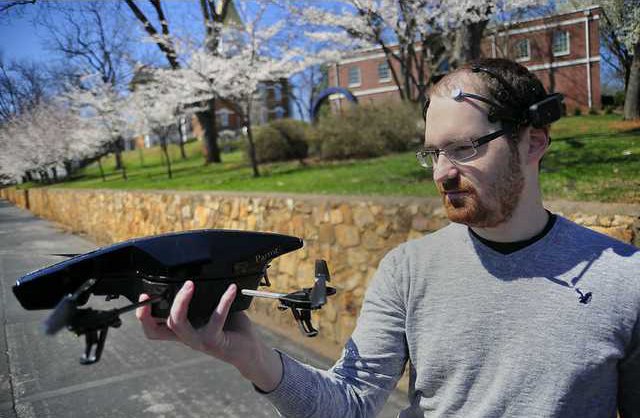 Students at the University of North Georgia are developing an idea is for a human brain to send signals through the electroencephalogram-sensor headset to a small, unmanned helicopter. The wearer would then control a UAS via his thoughts, without using manual controls.
Students at the University of North Georgia are developing an idea is for a human brain to send signals through the electroencephalogram-sensor headset to a small, unmanned helicopter. The wearer would then control a UAS via his thoughts, without using manual controls.
“Right now, we have the drones flying from the mobile phone,” said Bryson Payne, department head of the computer science and information systems programme at the University of North Georgia. “But it’s not powered by the brain quite yet.”
The project is funded through the Center for Undergraduate Research and Creative Activities, which encourages studies such as this one to be conducted earlier in a person’s college career.
“Usually you wait until you’re in a master’s program or a doctorate to get hands-on research and do cool stuff like this,” Payne said.
Cayce Koehler, along with Andrew Carter and Jeanette Freeman, are the three students testing the UAS technology. Payne and psychological science professor Chuck Robertson are overseeing the research.
“When you’re moving your left hand, the right side of your brain is kind of triggering off and sending out electrical impulse,” Koehler said. “So when you’re moving your left hand, the idea would be to move left based on that right impulse. The reverse is also true.”
But it’s not quite as easy as putting on the headset and thinking “Move left.” It will take some training to get a person’s mind to that level.
“We’re still doing a little research trying to figure out how exactly we want to do it,” said Freeman, a psychology major. “A lot of the stuff we’ve found so far is a lot of kind of meditation-type things.
“It’s just training the mind to think as if you’re clenching your right hand or raising your arm, but not necessarily the actions,” she added. “So it stimulates that portion of your brain.”
Basically, individuals have to trick their minds into thinking they’re completing the actions without actually moving.
“The hardest part will be triggering the rates at which your brain kind of gives off in the EEG reading,” Koehler said.
While now it seems the group is playing with toy helicopters, it’s a new technology with many real-life applications.
The University of North Georgia group is hopeful its research can apply to people with certain medical conditions.
“If somebody’s had a traumatic brain injury and they’re relearning to walk (it could be used),” Payne said. “Or someone is completely incapacitated and they could use the drone to look around their house. Or, you could have a UAS check in on a loved one. It’s some really cool stuff.”
Photo: Scott Rogers / The Times
Source: Gainsville Times
